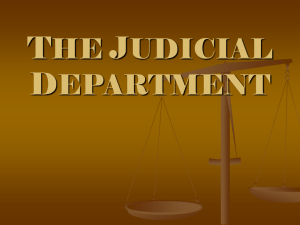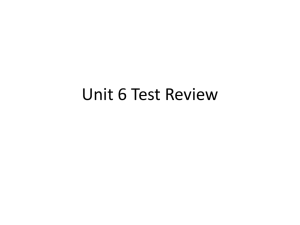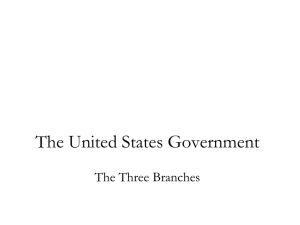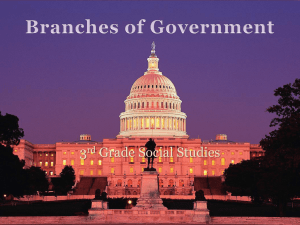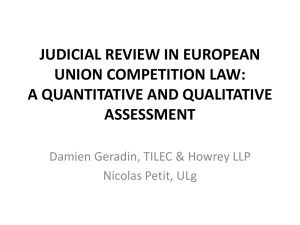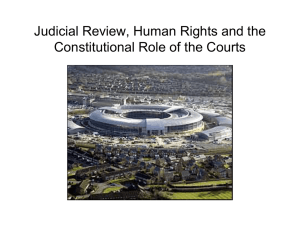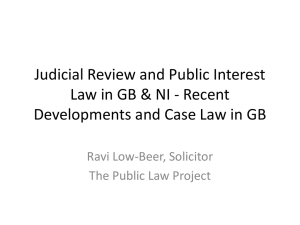Environmental Law
advertisement
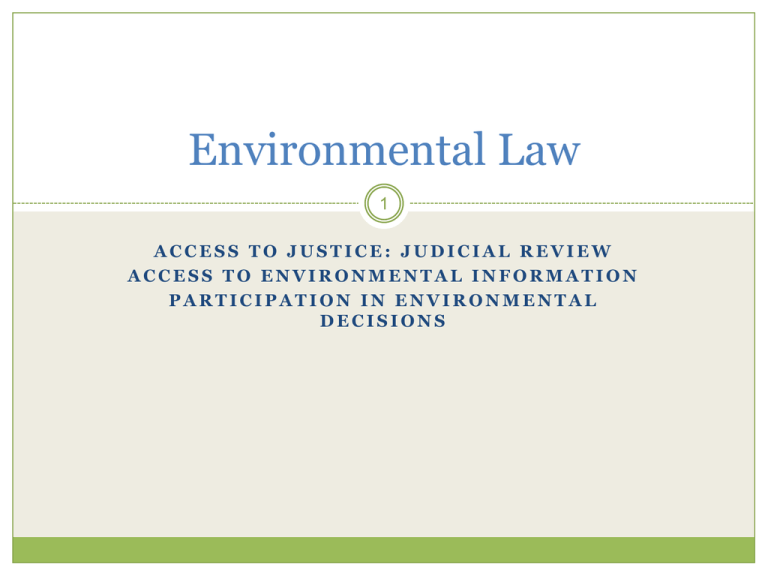
Environmental Law 1 ACCESS TO JUSTICE: JUDICIAL REVIEW ACCESS TO ENVIRONMENTAL INFORMATION PARTICIPATION IN ENVIRONMENTAL DECISIONS Access to Justice: Judicial Review 2 Environmental enforcement authorities are public bodies exercising public powers which are exercised under statute and delegated legislation It may be that authorities do not follow statutory procedures; arrive at decisions unfairly; make decisions in absence of authority High Court: Judicial Review: Ultra Vires Reasonableness Associated Provincial Picture House v Wednesbury Corporation [1948] 1KB 223. Judicial Review 3 Remedies: Certiorari; Prohibition; Mandamus Need to have: Standing Locus Standi Promptness [No Delay] Grounds [Wednesbury] Promptness Three months; other statutory provision; undue delay Alternative Statutory remedy R v Environment Agency, ex parte Petrus Oils[1999]EnvLR 732 Undue delay; good reason/prejudice Judicial Review 4 Flexibility Lack of promptness R v Swale BC, ex parte RSPB [1991] Commencement Date R v Secretary of State for Trade and Industry, ex parte Greenpeace [1998] Env LR 413 Courts have strictly enforced rules on delay As rules on standing have become liberalised But flexibility in Court discretion to determine applications in accordance with public interest R v Secretary of State for Trade and Industry, ex parte Greenpeace (No 2) [2000] Env LR 221. Judicial Review 5 Standing/Locus Standi Sufficient Interest Inland Revenue Commissioners v National Federation of Self Employed and Small Businesses [1982] AC 617 Lord Wilberforce R v Secretary of State for Environment, ex parte Rose Theatre Trust [1990] 1 AER 754 Local/general interest groups: geographic connection Liberalisation? Judicial Review 6 R v Pollution Inspectorate ex parte Greenpeace Ltd (No 2) [1994] 4 All ER 329 (Otton J) Refused to follow Rose Theatre R v Secretary of State for Foreign and Commonwealth Affairs, ex parte World Development Movement Ltd (Pergau Dam)[ 1995] 1 WLR 386 Discretion / Uncertainty? Judicial Review 7 Judicial Review of Secretary of State decision to refuse planning permission (not appeal) Article 6 ECHR Right to a fair, public and impartial hearing Human Rights compliant R (on the application of Alconbury Developments Ltd) v Secretary of State for the Environment, Transport and the Regions [ 2001] 2 All ER 929 Environmental Information 8 United Nations Convention on Access to Information, Public Participation in Decision-Making and Access to Justice in Environmental Matters 1998 (Aarhus Convention) EU Law Directive 2003/4/EC Environmental Information Regulations 2004 Duty on public authorities to provide environmental information to public Definition - Regulation 1 (State of elements of environment; emissions, releases, discharges; admin measures, policies, legislation, plans, programmes to protect; implementation reports; cost benefit analyses; state of human health and safety, including food chain. Time limits; exemptions Registers (DEFRA) Criticism Judicial Review(Public consultation) 9 R (on the application of Greenpeace Ltd) v Secretary of State for Trade and Industry [2007] Env L Rep 29 1 In this application for judicial review the claimant applies for a quashing order in respect of the defendant's decision, announced in “The Energy Challenge Energy Review Report 2006” to support nuclear new build as part of the United Kingdom's future electricity generating mix. The quashing order is sought on the ground that the consultation process leading to the decision was procedurally flawed and that therefore the decision was unlawful.(Mr Justice Sullivan) Judicial Review(Public consultation) 10 Consultation exercise was seriously flawed. Application for judicial review of the policy decision in the Energy Review that new nuclear build has a role to play in the future UK generating mix succeeds Granted declaratory relief to effect that there was a breach of claimant’s legitimate expectation to fullest public consultation; that consultation process was procedurally unfair; that the Energy Review decision that nuclear new build ‘has a role to play’ was unlawful.

